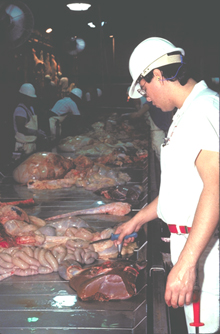|
The European Union banned farmers from injecting meat animals with 6 hormones including Testosterone and Progesterone. They also stopped the import of meat treated with these hormones. The U.S and Canada objected - as most of the animals they export to the EU are treated with these hormones. The US retaliated by imposing tariffs on cheeses, mustards, wines, and other profitable European exports - worth over $100million. The U.S. and Canada challenged the EU through the disputes process of the World Trade Organisation. The WTO first ordered the Europeans to drop the import ban however, the WTO allowed the European Union to maintain its ban on hormone-injected beef provided it proves such beef is dangerous to consumers. As a result the EU asked their Scientific Committee to carry out risk assessments of the hormones. They determined that the use of oestradiol 17ß be prohibited, and that the other 5 hormones (testosterone, progesterone, trenbolone acetate, zeranol and melengestrol acetate), be provisionally prohibited until more complete scientific information is made available. The appeal ruling showed that individual countries can maintain safety standards higher than internationally accepted standards, provided they can show that it is in order to protect its consumers not just their own markets. In October 2003, the EU notified the WTO that it has implemented the WTO ruling of 1998 by carrying out a risk assessment and that the USA's and Canada's sanctions against the EU are no longer justified. The United States and Canada disagreed and still refused to lift their sanctions at the end of 2004. |
© 2003 EP@W Publishing Co Ltd
Photos courtesy of http://www.usda.gov

